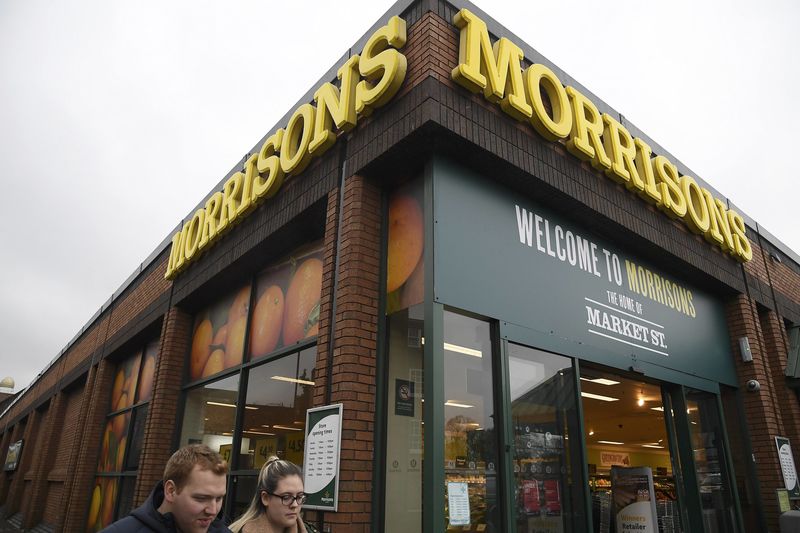By James Davey
LONDON (Reuters) - British supermarket Morrisons (L:MRW) raised its profit forecast on Tuesday after enjoying its strongest sales growth in seven years over the Christmas 2016 period, while industry data showed market leader Tesco (L:TSCO) was also a festive winner.
Britain's overall grocery market sales grew 1.8 percent in the 12 weeks to Jan. 1, the fastest growth since June 2014, data from market researcher Kantar Worldpanel showed. It said higher prices were returning to the market after two years of deflation.
While a return to food price inflation, in moderation, would be welcomed by investors in food retailers as it can boost sales and profit margins, the flip side is that it may begin to squeeze consumers' purchasing power later this year.
Analysts at Jefferies said the sector's major players faced a tough 2017, given the weakness of sterling, oil and commodity price rises, a deterioration in the outlook for UK disposable income and discounters' willingness to sacrifice profit margins with further price cuts.
Nevertheless, they see Morrisons, for which they have a "hold" recommendation, as better able to withstand these pressures than rivals.
Led by a new management team, Morrisons reported a fifth straight quarter of underlying sales growth, showing it was getting to grips with the turmoil sparked by the advance of German discounters Aldi [ALDIEI.UL] and Lidl [LIDUK.UL].
That news and the Kantar data sent shares in Morrisons and Tesco up 2.7 percent and 4.3 percent respectively by 1401 GMT. Sainsbury's was up 1.6 percent.
These moves partly reflected the covering of short positions in the sector's stocks.
No. 2 player Sainsbury's (L:SBRY) and Tesco publish Christmas trading updates on Wednesday and Thursday, respectively.
Morrisons, Britain's fourth biggest grocer, said more competitive pricing, new premium products and improved store standards helped it beat expectations for Christmas trading.
"We're delighted to have found our mojo," CEO David Potts told reporters.
"We're still in the fix phase of this company's recovery programme. However, our customers are responding."
He said Morrisons' priority was to be more competitive and further improve customer service before its recovery moves to a growth phase. He plans to update on the firm's growth plans in March.
Morrisons said sales at stores open over a year, excluding fuel, rose 2.9 percent in the nine weeks to Jan. 1, the bulk of its fourth quarter, ahead of analysts' average forecast of 1.1 percent growth and a third-quarter rise of 1.6 percent.
It now expects underlying pretax profit for 2016-17 of 330-340 million pounds, ahead of analysts' consensus of 326 million pounds and the 302 million pounds made in 2015-16.
Finance chief Trevor Strain said deflation had eased from 1.0 percent in its third quarter to 0.2 percent in the Christmas period.
REVIVAL
Former Tesco executive Potts joined Morrisons in March 2015 with a remit to revive the group after it suffered badly at the hands of discounters in its northern England heartland.
He delivered a 55 percent rise in the firm's shares in 2016.
Potts has also overhauled Morrisons' online strategy through a renegotiated agreement with distributor Ocado (L:OCDO) and a wholesale supply deal with Amazon (O:AMZN).
The Kantar data showed Tesco's total sales rose 1.3 percent in the 12-week period, driven by its performance in fresh food.
Sainsbury's sales fell 0.1 percent although unlike Morrisons and Tesco, it is not in turnaround mode.
Sales at Asda (N:WMT), 2016's industry laggard, dropped 2.4 percent. However, that was a significant improvement on recent industry reports, indicating a fight back could be on the cards in 2017.
Morrisons' and Tesco's share price recovery in 2016 coincided with a slowdown in sales growth at the two big German discounters.
However, on Monday Aldi reported strong Christmas sales, while the Kantar data showed it and Lidl's trading momentum improving.
Separate data on overall British retail sales showed they picked up speed in December, though sales of bigger ticket items were sluggish, a possible early sign that consumers are bracing for a hit to their spending power after Britain's vote to leave the European Union.
However, Potts said Morrisons had not yet discerned any change in consumer sentiment and remained optimistic on 2017 prospects.

"We are well set to do our very best work in whatever comes along," he said.